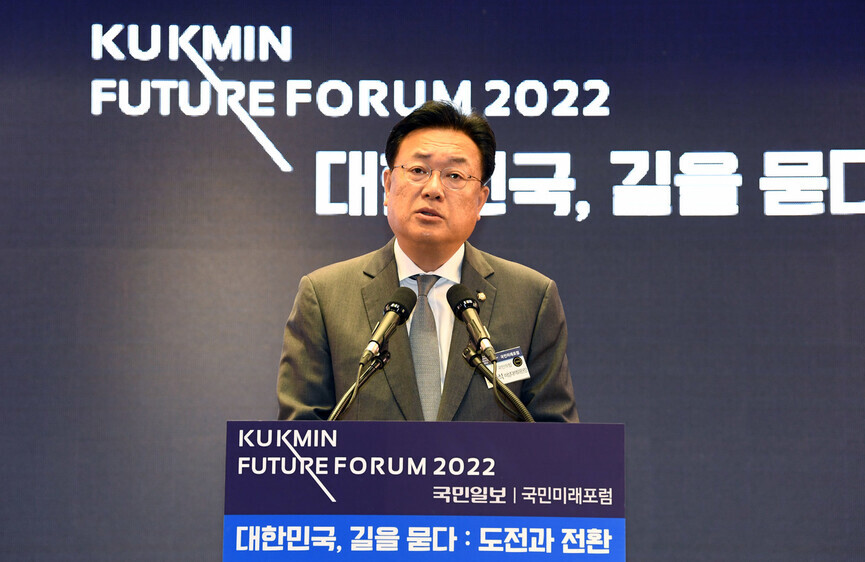hankyoreh
Links to other country sites 다른 나라 사이트 링크
[Editorial] Ruling party’s dangerous calls for tactical nukes in S. Korea

Chung Jin-suk, head of the People Power Party’s (PPP) emergency steering committee, has argued that the Joint Declaration of the Denuclearization of the Korean Peninsula ought to be ripped up if North Korea presses ahead with a seventh nuclear test.
Rep. Kim Gi-hyeon, also of the PPP, has said that South Korea will have no choice but to arm itself with nuclear weapons in such a situation, advocating for the independent nuclear armament of the country.
North Korea’s escalating nuclear threats are dangerous and unfortunate. However, the logic of responding to nuclear weapons with more nuclear weapons will only amplify the current crisis. This cannot be seen as a responsible position by the ruling party.
“We are the only ones binding our own hands with the inter-Korean joint denuclearization declaration. The time to decide has come,” said Chung on Wednesday, arguing that the joint declaration has been a dead letter since North Korea developed nuclear weapons. In addition, he stated that the Sept. 19 military agreement, in which both sides pledged to cease all hostile military acts, should also be scrapped.
On Tuesday, President Yoon Suk-yeol opened up the possibility of the redeployment of tactical nuclear weapons, saying, “We are listening to various opinions on the issue.” It appears that the ruling party’s leadership has begun raising the issue of nuclear armament following the president’s remarks.
North Korea revealed that it had conducted seven ballistic missile tests over the previous two weeks, including short-range ballistic missiles, a “new” intermediate-range ballistic missile, and a submarine-launched ballistic missile. The North has also argued that it is capable of striking key military command facilities in the South, such as the presidential office and airfields.
While the ruling camp is raising the issue of tactical nuclear weapons as a means to respond to the North’s nuclear threat, it is doubtful whether mentions of such a tit-for-tat response devoid of diplomacy and dialogue will be helpful in bringing about peace on the peninsula.
In addition, there are three ways in which South Korea could arm itself with nuclear weapons, and all three are unlikely to be successful: independent development, the deployment of American tactical nuclear weapons, and the joint operation of tactical nuclear weapons with neighboring countries.
Withdrawing from the Nuclear Non-Proliferation Treaty and going down the path of independent development of nuclear weapons is practically impossible as it would mean certain isolation from the international community. The redeployment of American tactical nuclear weapons or the joint operation of such weapons with neighboring countries is also out of Korea’s hands as it depends on the US’ global strategy.
The US, which plays the deciding role in this situation, said in regard to the controversy surrounding the deployment of tactical nuclear weapons, it would “leave it to our South Korean allies to speak to their policy.”
The specter of crisis has begun to loom larger over the Korean Peninsula following North Korea’s continued provocations. What we need now is a concrete response to manage the situation. Ruling party officials bringing up “nuclear armament,” when it is quite unrealistic, as well as the nullification of the inter-Korean military agreement, naturally raises the question: Are they using the security crisis as a means to overcome the current domestic political crisis?
Instead of dangerously and irresponsibly raising the possibility of tactical nuclear weapon deployment, the ruling party should be considering more viable solutions.
Please direct questions or comments to [english@hani.co.kr]

Editorial・opinion
![[Column] Has Korea, too, crossed the Rubicon on China? [Column] Has Korea, too, crossed the Rubicon on China?](https://flexible.img.hani.co.kr/flexible/normal/500/300/imgdb/original/2024/0419/9317135153409185.jpg) [Column] Has Korea, too, crossed the Rubicon on China?
[Column] Has Korea, too, crossed the Rubicon on China?![[Correspondent’s column] In Japan’s alliance with US, echoes of its past alliances with UK [Correspondent’s column] In Japan’s alliance with US, echoes of its past alliances with UK](https://flexible.img.hani.co.kr/flexible/normal/500/300/imgdb/original/2024/0419/2317135166563519.jpg) [Correspondent’s column] In Japan’s alliance with US, echoes of its past alliances with UK
[Correspondent’s column] In Japan’s alliance with US, echoes of its past alliances with UK- [Editorial] Does Yoon think the Korean public is wrong?
- [Editorial] As it bolsters its alliance with US, Japan must be accountable for past
- [Guest essay] Amending the Constitution is Yoon’s key to leaving office in public’s good graces
- [Editorial] 10 years on, lessons of Sewol tragedy must never be forgotten
- [Column] A death blow to Korea’s prosecutor politics
- [Correspondent’s column] The US and the end of Japanese pacifism
- [Guest essay] How Korea turned its trainee doctors into monsters
- [Guest essay] As someone who helped forge Seoul-Moscow ties, their status today troubles me
Most viewed articles
- 1[Column] The clock is ticking for Korea’s first lady
- 2[Correspondent’s column] In Japan’s alliance with US, echoes of its past alliances with UK
- 3Samsung barricades office as unionized workers strike for better conditions
- 4After 2 months of delayed, denied medical care, Koreans worry worst may be yet to come
- 5[Column] Has Korea, too, crossed the Rubicon on China?
- 6[Editorial] When the choice is kids or career, Korea will never overcome birth rate woes
- 7Hong Se-hwa, voice for tolerance whose memoir of exile touched a chord, dies at 76
- 8US overtakes China as Korea’s top export market, prompting trade sanction jitters
- 9Constitutional Court rules to disband left-wing Unified Progressive Party
- 10Nearly 1 in 5 N. Korean defectors say they regret coming to S. Korea